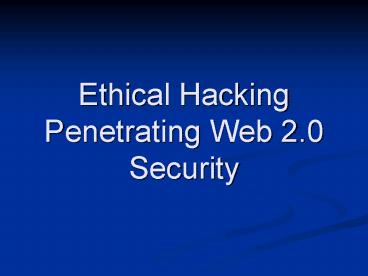Ethical Hacking Penetrating Web 2'0 Security - PowerPoint PPT Presentation
Title:
Ethical Hacking Penetrating Web 2'0 Security
Description:
Almost every Web site with a login is vulnerable. Layer 7 Denial of Service ... One client posts active content, with script tags or other programming content ... – PowerPoint PPT presentation
Number of Views:166
Avg rating:3.0/5.0
Title: Ethical Hacking Penetrating Web 2'0 Security
1
Ethical HackingPenetrating Web 2.0 Security
2
Contact
- Sam Bowne
- Computer Networking and Information Technology
- City College San Francisco
- Email sbowne_at_ccsf.edu
- Web samsclass.info
3
Two Hacking Classes
- CNIT 123 Ethical Hacking and Network Defense
- Has been taught since Spring 2007 (four times)
- Face-to-face and Online sections available Fall
2008 - CNIT 124 Advanced Ethical Hacking
- Taught for the first time in Spring 2008
4
Supplemental Materials
- Projects from recent research
- Students get extra credit by attending conferences
5
Certified Ethical Hacker
- Those two classes prepare students for CEH
Certification
6
Certificate in Network Security
7
Associate of Science Degree
8
Four Vulnerabilities
- SQL Injection
- 16 of Web sites vulnerable
- Cross-Site Scripting
- 65 of major sites vulnerable
- Cross-Site Request Forgery
- Almost every Web site with a login is vulnerable
- Layer 7 Denial of Service
- Every site with active content is vulnerable
9
SQL Injection
10
E-Commerce Web Site
Web Server
Database(SQL) Server
CustomerSends name, password, order requests,
etc.
11
E-Commerce Login
- HTML Form collects name and password
- It's processed at the SQL server with code like
this - SELECT FROM customer WHERE username name'
AND password pw'
12
SQL Injection
- If a hacker enters a name of OR 11 --
- The SQL becomes
- SELECT FROM customer
- WHERE username OR 11 --' AND password
pw - The -- ends the statement, making the rest of the
line a comment - 11 is always true, so this makes the condition
true
13
Demonstration
14
SQL Injection Effects
- This can cause the user to be authenticated as
administrator, dump the entire database, or have
other drastic effects - Comic from xkcd.org
15
Sanitize your Inputs
- All user input should be checked, and special
characters like ' or '' or lt or gt discarded - That will reduce vulnerability to SQL injection
- The typical SQL Injection vulnerability takes
more than four months to locate and fix
16
Cross-Site Scripting (XSS)
17
Web Message Board
Web server
Clients posting and reading comments
18
Cross-Site Scripting (XSS)
- One client posts active content, with ltscriptgt
tags or other programming content - When another client reads the messages, the
scripts are executed in his or her browser - One user attacks another user, using the
vulnerable Web application as a weapon
19
Demonstration
- ltscriptgtalert("XSS vulnerability!")lt/scriptgt
- ltscriptgtalert(document.cookie)lt/scriptgt
- ltscriptgtwindow.location"http//www.ccsf.edu"lt/scr
iptgt
20
XSS Scripting Effects
- Steal another user's authentication cookie
- Hijack session
- Harvest stored passwords from the target's
browser - Take over machine through browser vulnerability
- Redirect Webpage
- Many, many other evil things
21
Cross-Site Request Forgery (XSRF)
22
Web-based Email
To Internet
Router
AttackerSniffingTraffic
TargetUsingEmail
23
Cross-Site Request Forgery (XSRF)
- Gmail sends the password through a secure HTTPS
connection - That cannot be captured by the attacker
- But the cookie identifying the user is sent in
the clearwith HTTP - That can easily be captured by the attacker
- The attacker gets into your account without
learning your password
24
Demonstration
25
XSRF Countermeasure
- Use https//mail.google.com instead of
http//gmail.com - No other mail service has this option at all, as
far as I know
26
Application-Layer Denial of Service
27
Application-Layer DoS
- Find small requests that consume a lot of server
resources - Application Crashing
- Data Destruction
- Resource Depletion
- Memory
- CPU
- Bandwidth
- Disk Space
28
Resource Depletion Example
- CPU Consumption
- On a large forum
- Create a complicated regular expression search
- Use a script to launch the search over and over
29
Real-World Test
- Hacktics, a security company, brought down a
large corporate network with just three laptops
in an authorized test - Global company with branches in Israel, Europe
and the USA - Internet Connectivity 3x50Mbps lines with load
balancing. ISPs provide Cisco (Riverhead) based
Anti DDoS solutions - High security network, 30 Web servers, backend
servers, Mail Relay, databases
30
Hacktics Results
- DoS was successful to all systems but one
- Two applications crashed completely after a few
dozen requests only - Most other applications stopped responding after
5-15 minutes of script execution from up to three
laptops (though with most a single laptop was
sufficient) - Main cause of DoS was CPU exhaustion
31
References
- Where the Web is Weak
- http//www.forbes.com/2008/05/14/web-hacking-googl
e-tech-security08-cx_ag_0514webhack.html - Application-Layer DDoS Attacks
- networks.rice.edu/papers/2006-04-Infocom-final.ppt































